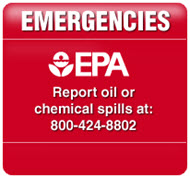How to Report Spills and Environmental Violations
Are you concerned about an environmental situation within your community but don't know where to go for answers? Learn more:
- Reporting:
- On this page:
- On other pages:
- Getting help:
- Learn about:
Who do I call to report an oil or chemical spill or other environmental emergency that poses a sudden threat to public health?
For emergencies and other sudden threats to public health, such as:
- oil and/or chemical spills,
- radiation emergencies, and
- biological discharges,
call the National Response Center at 1-800-424-8802.
- Under the Emergency Planning and Community Right-to-know (EPCRA), certain facilities also need to report hazardous substance releases to state/local officials.
- Report dumping incidents in international ocean waters
- Report complaints, tips, and violations that have to do with lead-based paint
- For non-emergency, non-sudden-threat spills, see the section below.
Where do I report the illegal use of a pesticide, or another possible violation of environmental laws or regulations?
- View more information related to reporting incidents related to harm from pesticides when these groups may have been exposed:
- Report dumping incidents in international ocean waters.
- For all other incidents, fill out the form at epa.gov/tips. If you don't have Internet access, call the EPA office in your area of the country (see the phone numbers in the "Want to Report a Spill or Violation..." box on this page).
Many issues are handled at the local level. You may first want to try contacting your local government office for concerns about trash, litter, strange odors, recycling pickup, and household chemical disposal, including paints, pesticides, oil, antifreeze, etc. You can find information about your local government in the blue pages of your telephone book or by contacting your public library.
For concerns that may not be handled at the local level, the next step is to contact your state environmental agency. Information about state agencies can be found in the blue pages of your telephone book as well.
Resources in the event of pesticide poisoning, non-emergency pesticide spills, and chemical spills
- For pesticide poisoning, call 911 if the person is unconscious, has trouble breathing, or has convulsions. Otherwise, call Poison Control at 1-800-222-1222.
- For information about cleaning up or otherwise dealing with non-emergency pesticide spills, you can contact:
- the National Pesticide Information Center at (800) 858-7378
- the pesticide manufacturer. Their contact information is on the product label.
- For chemical spills, CHEMTREC provides access to technical experts on chemical products and hazardous materials, and maintains a large database of Material Safety Data Sheets. CHEMTREC can be reached at (800) 424-9300.
What's an environmental violation versus an emergency?
- smoke or other emissions from local industrial facilities;
- tampering with emission control or air conditioning systems in automobiles;
- improper treatment, storage, or disposal of hazardous wastes;
- exceedances of pollutant limits at publicly-owned wastewater treatment plants;
- unpermitted dredging or filling of waters and wetlands;
- any unpermitted industrial activity; or
- late-night dumping or any criminal activity including falsifying reports or other documents.
- oil and chemical spills,
- radiological and biological discharges, and
- accidents causing releases of pollutants
These emergencies may occur from transportation accidents, events at chemical or other facilities using or manufacturing chemicals, or as a result of natural or man-made disaster events. If you are involved in or witness an environmental emergency that presents a sudden threat to public health, you must call the National Response Center at: 1-800-424-8802.
Where can I find information on spills that have already happened?
You can view reports of previous incidents reported to the National Response Center. Data received via the National Railroad Hotline (1-800-424-0201) are also available, as are reports taken during drills or spill exercises.

Phone Numbers to Report Environmental Violations
To report violations, please contact your EPA Regional Office. These numbers are operational during normal working hours, Monday through Friday, local time. Unfortunately, we are unable to staff them in the evenings or on weekends.
Region 1 / New England (ME, NH, VT, MA, RI, CT): 1-888-372-7341
Region 2 (NY, NJ, Puerto Rico and U.S. Virgin Islands): 1-212-637-4040
Region 3 / Mid-Atlantic (DC, DE, MD, PA, VA, WV): 1-800-438-2474 (from locations within the Region 3 states) or 1-215-814-5000 (from locations outside of the Region 3 states)
Region 4 / Southeast (MS, TN, AL, GA, FL, KY, SC, NC): 1-800-241-1754 or 1-404-562-9900
Region 5 / Great Lakes (IL, IN, MI, MN, OH, WI): 1-312-353-2000
Region 6 / South Central (AR, LA, NM, OK, TX): from Region 6 states, 1-800-887-6063; from elsewhere, 1-214-665-2210
Region 7 / Midwest (IA, KS, MO, NE): 1-800-223-0425
Region 8 / Mountains and Plains (CO, MT, ND, SD, UT, WY): 1-303-312-6054
Region 9 / Pacific Southwest (AZ, CA, HI, NV, Guam, American Samoa): 1-800-300-2193
Region 10 / Pacific Northwest (AK, ID, OR, WA): 1-800-424-4372 or 1-206-553-4973
